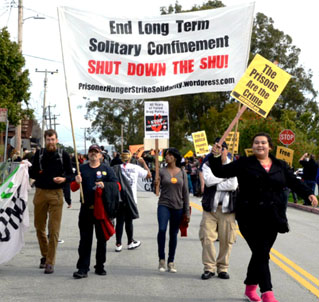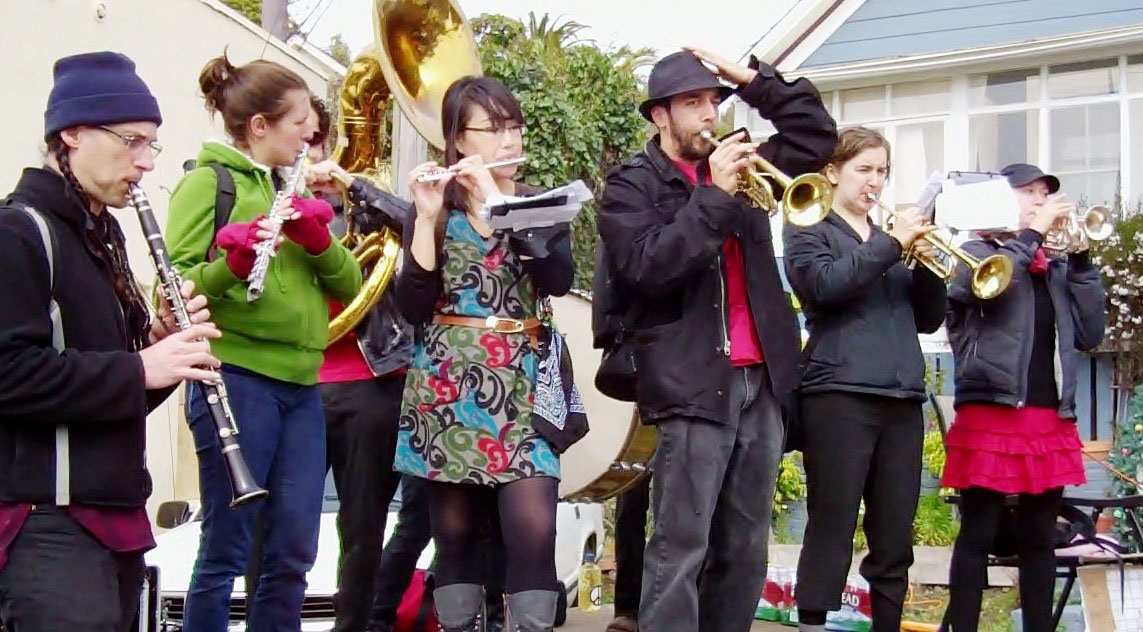by Eric Moon
[dropcap]O[/dropcap]n Monday, February 20, a beautiful Presidents Day, about one thousand activists walked the mile in to San Quentin State Prison for a deeply patriotic event, as activists from the Occupy movement joined with prison reform activists to stand up for the human rights of prisoners whose suffering is usually invisible to the public, concealed behind the concrete walls of California’s vast prison system.
The day may not have had fireworks, but it was enlivened by the exultant music from an inspiring brass band from Occupy SF — the Brass Liberation Orchestra. The demonstration was held to expose prison abuses and to bear witness on behalf of the multitudes behind bars who are excluded from our society’s democracy.
Speakers at San Quentin called for an end to solitary confinement and the abolition of the death penalty. They condemned the state’s sentencing laws as too harsh.
Among the mission tasks of the American Friends Service Committee are: highlighting connections between social issues and encouraging the voices of unheard constituencies. The February 20 rally was an historic breakthrough in both areas, as Occupy activists in the Bay Area and across the nation stood up for prisoners and their families.
Way back in October, as California prisoners were coming out of their second hunger strike [see “Historic Hunger Strike Launches a Movement” from the August Street Spirit] and celebrating a newfound awareness by media and public of the evils of arbitrary and prolonged solitary confinement, a few of them sent a message to another newly awakened group, Occupy Oakland. That message — “Wish We Were There” — thanked the Occupy movement for their witness and asked that the lives of the bottom 1% of the 99% — prisoners and their families — be included in the Occupy critique.
In November, Occupy Oakland’s General Assembly voiced support for the prison hunger-strikers, and in January, the assembly approved an outreach proposal (see box) to Occupy groups nationwide, designating February 20 as Occupy National Day in Support of Prisoners, and initiating an ongoing focus on prison issues.
Even as Occupy protests nationwide have spoken out on life-and-death issues that Republicans and Democrats are politically embarrassed to speak about, prison activists (many of them prisoners) are finding their voices again, as well. In addition to messages from Angela Davis, Leonard Peltier, and Mumia Abu-Jamal, the San Quentin rally heard from prisoners like Kevin Cooper, confined on our own death row, soon to face the lethal needle — unless voters abolish our death penalty next November. George Jackson, Tookie Williams, and Troy Davis also were remembered.
Sarah Shourd, Shane Bauer, and Josh Fattal, hikers imprisoned two for years in Iran, spoke at the rally about the effects of their solitary confinements. Each had tried using hunger striking, which resulted in some amelioration of their conditions. In California, by contrast, prisoner hunger strikers were charged with “creating a disturbance” and were harshly punished.
Elsewhere, Occupy actions in 16 other cities were held at city jails and county courthouses, each highlighting a local instance of mass incarceration mania — Albany, Austin, Baltimore, Boston, Chicago, Columbus, Denver, Durham, Eureka, Fresno, Los Angeles, New York City, Philadelphia, San Luis Obispo, Seattle, Washington, D.C.
“Inside and Outside” was a theme on many of the banners and placards. On the outside, activists made the connections: the institutions and actors that robbed the 99% over the last decade have been robbing prisoners and their families much longer. How can we work together, outside and inside, to regain our share of the political process?
On the inside, prisoners drew fresh oxygen for their long struggle. Correll Thomas, on San Quentin death row, later reported to his wife that the tier officer had claimed there were only 50 people out there. In customary overreaction to threats of free speech, the prison had locked down, suspending all inmate programs, so guards could be sent out to the gate to watch the demonstration. When prisoners started seeing and hearing the actual crowd, on the television news shows, Thomas said, most of them felt that the large rally made it worth being locked down.
Thomas said, “We wrote down any names of groups we could see on their banners. Could you send me their addresses, so we could thank them?”
Occupy Oakland Demands End to Prison Brutality
This proposal was passed at the Occupy Oakland General Assembly on January 8, 2012

Prisons have become a central institution in American society, integral to our politics, economy and our culture.
Between 1976 and 2000, the United States built, on average, a new prison each week and the number of imprisoned Americans increased tenfold.
Prison has made the threat of torture part of everyday life for millions of individuals in the United States, especially the 7.3 million people — who are disproportionately people of color — currently incarcerated or under correctional supervision. Imprisonment itself is a form of torture.
The typical American prison, juvenile hall and detainment camp is designed to maximize degradation, brutalization, and dehumanization.
Mass incarceration is the new Jim Crow. Between 1970 and 1995, the incarceration of African Americans increased 7 times. Currently African Americans make up 12 percent of the population in the U.S. but 53 percent of the nation’s prison population. There are more African Americans under correctional control today — in prison or jail, on probation or parole — than were enslaved in 1850, a decade before the Civil War began.
The prison system is the most visible example of policies of punitive containment of the most marginalized and oppressed in our society. Prior to incarceration, two-thirds of all prisoners lived in conditions of economic hardship, while the perpetrators of white-collar crime largely go free.
In addition, the Center for Economic and Policy Research estimated that in 2008 alone there was a loss in economic input associated with people released from prison equal to $57 to $65 billion.
We call on Occupies across the country to support:
1. Abolishing unjust sentences, such as the death penalty, life without possibility of parole, Three Strikes, juvenile life without parole, and the practice of trying children as adults.
2. Standing in solidarity with movements initiated by prisoners and taking action to support prisoner demands, including the Georgia Prison Strike and the Pelican Bay/California Prisoners Hunger Strikes.
3. Freeing political prisoners, such as Mumia Abu-Jamal, Leonard Peltier, Lynne Stewart, Bradley Manning and Romaine Fitzgerald.
4. Demanding an end to the repression of activists, specifically the targeting of African Americans and those with histories of incarceration, such as Khali in Occupy Oakland who could now face a life sentence, on trumped-up charges, and many others being falsely charged after only exercising their First Amendment rights.
5. Demanding an end to the brutality of the current system, including the torture of those who have lived for many years in Secure Housing Units (SHUs) or in solitary confinement.
6. Demanding that our tax money spent on isolating, harming and killing prisoners, instead be invested in improving the quality of life for all and be spent on education, housing, health care, mental health care and other human services which contribute to the public good.
